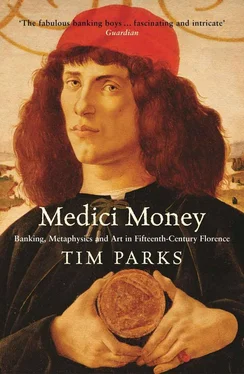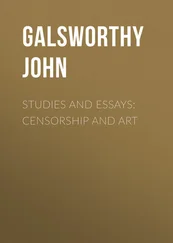Cosimo di Giovanni de’ Medici eventually disobeys that order, which is why he will later be reverently known as Cosimo Pater Patriae , Father of His Country. His dates are 1389 to 1464, thus making him the longest lived of our five wealthy men. Having survived brief imprisonment and exile, Cosimo takes the Medici bank to its maximum extension and profitability and moves decisively into politics to the point of more or less running the Florentine Republic. He is a friend to philosophers, architects, and painters; a patron of the arts; and benefactor of major public works. At his death the bank has already entered a decline from which it will never recover.
Piero di Cosimo de’ Medici came to be known as Piero il Gottoso , or Piero the Gouty. Many male members of the Medici family suffered from gout, a hereditary form of arthritis involving painful and ultimately chronic inflammation of the joints. If Piero was the one singled out for the unhappy nickname, it was simply because he didn’t outlive his father long enough to be known for much else. To Piero, however, goes the merit, or blame, of establishing a principle of succession where no succession should have been. Piero was head of the Medici bank by hereditary right, but there was no constitutional reason why he should have taken over from Cosimo as key man in the Florentine state. Frail, bedridden, and bad-tempered, he was nevertheless more determined and effective than his republican enemies. Born in 1416, Piero ran the show for just five years, from 1464 to 1469, before handing over the vast family fortune more or less intact to eldest son Lorenzo in 1469.
Lorenzo was to be known as Il Magnifico . So much for keeping out of the public eye. Just twenty when thrust into the limelight, he puts his eggs in other baskets than finance and commerce, allowing the family bank to slide into now-irretrievable decline. Like his father and grandfather, Lorenzo survives a major conspiracy and shows great skills of political manipulation. Unlike them, he aspires to the aristocracy, writes poetry (good poetry), and barely seeks to disguise a vocation for dictatorship. In 1492, aged forty-three, unable, due to the gout, to visit his portly mistress, Lorenzo finally succumbs to a variety of ailments.
Last of the five, Piero di Lorenzo would all too soon be known as Piero the Fatuous. His father’s artistic achievements and pretensions to nobility proved less transferable as assets than the vast monetary wealth left by his great-grandfather, now drastically diminished. Born in 1472, Piero possessed but one talent, a flair for the game of Florentine football, as a result of which his two years as head of the family were an unhappy parody of his father’s more effective maneuverings. He fled Florence, perhaps unnecessarily, as French troops approached the city in 1494. The family wealth was confiscated, the bank collapsed, and ten years later Piero confirmed his incompetence, or perhaps just bad luck, when he drowned crossing the Garigliano, a river north of Naples.
The trajectory, then, is clear enough. One hundred years. Five generations. A vertiginous rise of fortune — first economic, then political — in the hands of two most able administrators. A brief hinge period presided over by a grumpy, middle-aged man in bed. Then two and a half decades of political ascendancy predicated on a wealth that is rapidly disappearing. Followed by sudden and complete collapse. To which we might add that despite their different characters, our five Medici have certain traits in common beyond the gout. They were all ugly, Il Magnifico spectacularly so. And they were avid collectors: of sacred relics and ceremonial armor, of manuscripts, of jewels, of cameos. The collecting habit, with its impulse toward control, order, and possession, is akin to the spheres of both banking and art.
WHEN WE THINK of the period that has come to be known as the Renaissance, we think above all of the fifteenth and early sixteenth centuries; we think of the great art and architecture produced then, from Brunelleschi to Michelangelo; and we are aware of the Medici insofar as they had a relation to that art and those artists. Hence we think of them, and above all of Cosimo and Lorenzo, as living in the heyday of early modern times, before which, with the forward-looking exceptions of Dante, Giotto, and Boccaccio, all is darkness. Thus the myth. Yet there is a sense in which the men we are talking about, and particularly Giovanni di Bicci and Cosimo, must have seen themselves rather as coming afterward , of living in the aftermath of something, not the beginning of a golden age.
As bankers they came after the innovations that had given the Italians a virtual monopoly on European finance: after the invention of double-entry bookkeeping, after the advent of the bill of exchange, the letter of credit, and the deposit account. The Medici invented nothing in banking practice, unless perhaps we are to think of the relation between their parent company and subsidiaries as an early form of holding. What’s more, all the Medici would have been very aware of coming after banks far larger than their own. The Bardi and Peruzzi banks of the thirteenth and fourteenth centuries had amassed fortunes that the Medici would never equal. Both collapsed in the 1340s, when Edward III of England reneged on huge debts. Giovanni di Bicci de’ Medici was in partnership with various men of the Bardi family, employed others, and married his son Cosimo to a Bardi girl. Memories of past glory and a sense of the precariousness of banking wealth must often have been on his mind.
Then, as citizens of Florence, the Medici came after all the upheavals that had made their republic what it was: after the slow collapse of feudal law as the Holy Roman Empire turned its attention northward and lost its grip on a rapidly fragmenting Italy; after the transfer of power, amid endless upheavals, from hereditary lords based in the country to the wealthy classes of the cities; after the formation of a Florentine state with a republican constitution; after the war against papal Rome when the city’s government seized and sold Church property until the people rebelled in a frenzy of religious feeling that eventually turned political in the revolt of 1378. This was the so-called ribellione dei ciompi , when the city’s poor woolworkers tried to oust the mercantile classes as they, the merchants, had ousted the nobles a century before.
“The men left in the government,” wrote the sixteenth-century historian Francesco Guicciardini of this revolt, “were mostly plebs, men of the crowd rather than nobles, with Messer Giorgio Scali and Messer Tommaso Strozzi at their head, and with popular support they governed three years in which time they did many ugly things, most of all when, for no crime actually committed, but just to be rid of their enemies, they cut off the heads of Piero di Filippo degli Albizzi, once the most renowned citizen of Florence, and likewise of Messer Donato Barbadori and of many other innocents, until in the end, as is the custom, when the people couldn’t put up with it any more, they deserted Messer Giorgio and cut his head off; Messer Tommaso saved his life by fleeing the town and was banned from returning in perpetuity, he and his descendants, and Messer Benedetto degli Alberti, who was one of the first to support them, was sent into exile.”
One sentence, two changes of regime, various executions. “ Come è usanza ,” says Guicciardini—“as is the custom.” Silvestro de’ Medici, the most prominent member of the Medici family and recent head of the Florentine government, had sided with the woolworkers. The family fell into disgrace. Giovanni di Bicci, eighteen at the time, would have seen every reason for keeping his head down, if the alternative was to have it cut off.
Читать дальше












